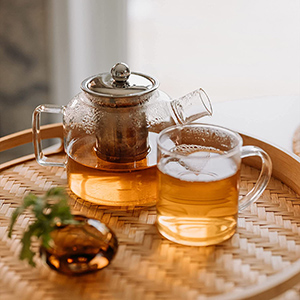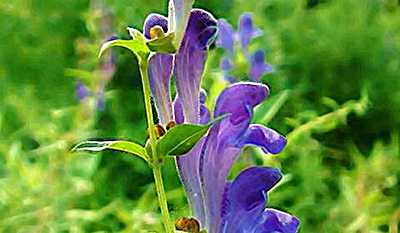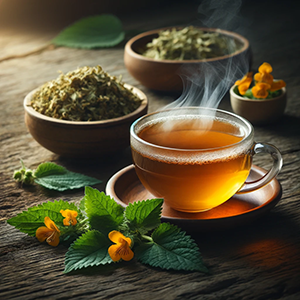The skullcap plant is one of the best herbs for any nervous problem and should be in everyone’s herbal collection. It is a very reliable and safe nerve sedative. It is considered to be food for the nerves. Skullcap supports and strengthens them and gives instantaneous relief for all acute and chronic diseases stemming from nervous debilities and affection.

Skullcap benefits all mild or chronic nerve problems. This herb can be combined with other nervine, tonic, and antispasmodic herbs such as passion flower, lady’s slipper, wood betony, and hops. The plant is essentially nontoxic and can be used freely. An ounce of the herb can be steeped in a pint of boiled water for ten minutes.
As an internal remedy, it can treat a variety of conditions, including excitability, spasms, restlessness, hysteria, hyperactivity, nervous headaches, fatigue, anxiety, stress, pain, muscle cramps, insanity, indigestion, coughs, convulsions, neuralgia, epilepsy, insomnia, and drug and alcohol withdrawal symptoms. It can also be used to wean people from excessive use of valium, barbituates, and other addictions.
A combination of skullcap (1/2 ounce) and American ginseng (1/4 ounce), taken in frequent tiny doses, can treat alcoholism. First, make an infusion of skullcap and a decoction of ginseng root, then combine them. Native Americans used the herb to promote menstruation and to reduce pains of the uterine or ovarian origin. Skullcap can also strengthen the heart muscle and is effective against rabies.

What is Scullcap?
Scullcap is a traditional Chinese herb from the mint family typical in wellness practices worldwide. This enduring plant blooms bright purple flowers and holds copious roots and leaves with naturally occurring antioxidant flavonoids.
NOTE: Skullcap needs to be used as fresh as possible; otherwise, their medicinal properties quickly dissipate.

Skullcap Scientific Facts
1. Scientific name—Scutellaria lateriflora
2. Parts used—Tops
3. Properties—Antispasmodic, antipyretic, nervine.
4. What it affects—Nerves and stomach.
How to use Skullcap
Infusion: Steep for fifteen to thirty minutes and take three ounces four to five times daily. Tincture: Take ten to forty drops three to four times daily. Fluid Extract: Take ¼ teaspoon three to four times daily. Powder: Take three to five #0 capsules (15 to 30 grains) twice or more daily.
DISCLAIMER: All content on this website is presented solely for educational and informational objectives. Do not rely on the information provided as a replacement for advice, diagnosis, or treatment from a qualified medical expert. If you are pregnant, nursing, or have any preexisting medical concerns, talk to your doctor before using any herbal or natural medicines.
REFERENCES
- Vance Ferrell Harold M. Cherne, M.D. The Natural Remedies Encyclopedia [Book]. – Altamont, TN: Harvestime Books, 2010. – Vol. Seventh Edition: 7: pp. 179, 180.
- Study: Brock, C., Whitehouse, J., Tewfik, I., & Towell, T. (2014). American Skullcap (Scutellaria lateriflora): A Randomised, Double-Blind Placebo-Controlled Crossover Study of its Effects on Mood in Healthy Volunteers. Phytotherapy Research, 28(5), 692-698. https://pubmed.ncbi.nlm.nih.gov/24038192
- Traditional use reference: Skullcap | Mount Sinai – New York. (n.d.). https://www.mountsinai.org/health-library/herb/skullcap
- General information: Skullcap: Benefits, Side Effects, and Dosage – Healthline. (2019, July 11). https://www.healthline.com/nutrition/skullcap
- Study: Yuan, Z., Mehendale, S., Wang, X., Aung, H. H., Xie, J. T., & Ang, C. Y. (2014). Scutellaria baicalensis and its major flavonoids, baicalin and wogonin, inhibit formalin-induced pain responses by activation of L-arginine/NO/cGMP pathway. Phytotherapy Research, 28(1), 74-82. https://pubmed.ncbi.nlm.nih.gov/23512983
- Study: Yu, Y., Shen, M., Song, X., Xie, J., & Shan, Y. (2017). Anti-Inflammatory Effects of Flavones From Scutellaria baicalensis in LPS-Stimulated RAW 264.7 Macrophages. Molecular Medicine Reports, 15(6), 4425-4432. https://pubmed.ncbi.nlm.nih.gov/28451839
